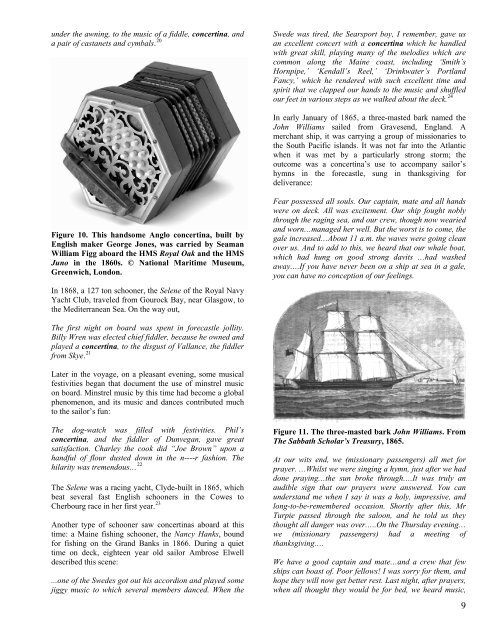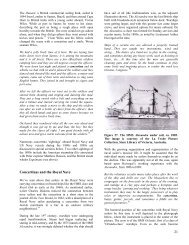The Concertina at Sea - The Anglo-German Concertina
The Concertina at Sea - The Anglo-German Concertina
The Concertina at Sea - The Anglo-German Concertina
You also want an ePaper? Increase the reach of your titles
YUMPU automatically turns print PDFs into web optimized ePapers that Google loves.
nder the awning, to the music of a fiddle, concertina, and<br />
a pair of castanets and cymbals. 20<br />
u<br />
Figure 10. This handsome <strong>Anglo</strong> concertina, built by<br />
English maker George Jones, was carried by <strong>Sea</strong>man<br />
William Figg aboard the HMS Royal Oak and the HMS<br />
Juno<br />
in the 1860s. © N<strong>at</strong>ional Maritime Museum,<br />
Greenwich, London.<br />
In 1868, a 127 ton schooner, the Selene of<br />
the Royal Navy<br />
Yacht<br />
Club, traveled from Gourock Bay, near Glasgow, to<br />
the Mediterranean <strong>Sea</strong>. On the way out,<br />
<strong>The</strong> first night on board was spent in forecastle jollity.<br />
Billy Wren was<br />
elected chief fiddler, because he owned and<br />
played a concertina,<br />
to the disgust of Vallance, the fiddler<br />
from Skye. 21<br />
L<strong>at</strong>er in the voyage, on a pleasant evening, some musical<br />
festivities began th<strong>at</strong> document the use of minstrel music<br />
on board. Minstrel music<br />
by this time had become a global<br />
phenomenon,<br />
and its music and dances contributed much<br />
to the sailor’s fun:<br />
<strong>The</strong> dog-w<strong>at</strong>ch was filled with festivities. Phil’s<br />
concertina, and the fiddler of Dunvegan, gave gre<strong>at</strong><br />
s<strong>at</strong>isfaction. Charley the cook<br />
did “Joe Brown” upon a<br />
handful<br />
of flour dusted down in the n----r fashion. <strong>The</strong><br />
hilarity was tremendous… 22<br />
<strong>The</strong> Selene was a racing yacht, Clyde-built<br />
in 1865, which<br />
be<strong>at</strong><br />
several fast English schooners in the Cowes to<br />
Cherbourg race in her first year. 23<br />
Another type of schooner saw concertinas aboard <strong>at</strong> this<br />
time: a Maine fishing schooner, the Nancy Hanks, bound<br />
for fishing on the Grand<br />
Banks in 1866. During a quiet<br />
time on deck, eighteen year old sailor Ambrose Elwell<br />
described this scene:<br />
...one of the Swedes got out his accordion and played some<br />
jiggy music to which several members danced. When the<br />
Swede was tired, the <strong>Sea</strong>rsport boy, I remember, gave us<br />
an excellent concert with a concertina which he handled<br />
with gre<strong>at</strong> skill, playing many of the melodies which are<br />
common along the Maine coast, including ‘Smith’s<br />
Hornpipe,’ ‘Kendall’s Reel,’ ‘Drinkw<strong>at</strong>er’s Portland<br />
Fancy,’ which he rendered with such excellent time and<br />
spirit<br />
th<strong>at</strong> we clapped our hands to the music and shuffled<br />
our feet in various steps as we walked about the deck. 24<br />
In early January of 1865, a three-masted bark named the<br />
John Williams sailed from Gravesend, England. A<br />
merchant ship, it was carrying a group of missionaries to<br />
the South Pacific islands. It was not far into the Atlantic<br />
when it was met by a particularly strong storm; the<br />
outcome was a concertina’s use to accompany sailor’s<br />
hymns<br />
in the forecastle, sung in thanksgiving for<br />
deliverance:<br />
Fear possessed all souls. Our captain, m<strong>at</strong>e and all hands<br />
were on deck. All was excitement. Our ship fought nobly<br />
through the raging sea, and our crew, though now wearied<br />
and worn…managed her well. But the worst is to come, the<br />
gale increased…About 11 a.m. the waves were going clean<br />
over us. And to add to this, we heard th<strong>at</strong> our whale bo<strong>at</strong>,<br />
which had hung on good strong davits …had<br />
washed<br />
away….If<br />
you have never been on a ship <strong>at</strong> sea in a gale,<br />
you can have no conception of our feelings.<br />
Figure<br />
11. <strong>The</strong> three-masted bark John Williams. From<br />
<strong>The</strong> Sabb<strong>at</strong>h Scholar’s Treasury, 1865.<br />
At our wits end, we (missionary passengers) all met for<br />
prayer. …Whilst we were singing a hymn, just after we had<br />
done praying…the sun broke through….It was truly an<br />
audible sign th<strong>at</strong> our prayers were answered. You can<br />
understand me when I say it was a holy, impressive, and<br />
long-to-be-remembered occasion. Shortly after this, Mr<br />
Turpie passed through the saloon, and he told us they<br />
thought all danger<br />
was over…..On the Thursday evening…<br />
we<br />
(missionary passengers) had a meeting of<br />
thanksgiving….<br />
We have a good captain and m<strong>at</strong>e…and a crew th<strong>at</strong> few<br />
ships can boast of. Poor fellows! I was sorry for them, and<br />
hope they will now get better rest. Last night, after prayers,<br />
when all thought they would be for bed, we heard music,<br />
9




